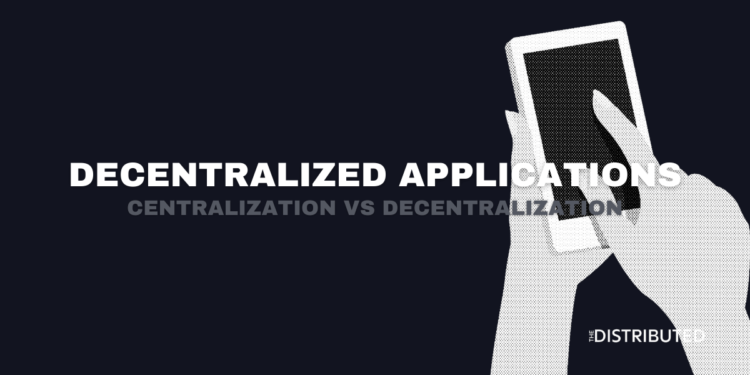What Are Decentralized Applications (dApps)?
Decentralized applications (dApps) are software programs built upon a peer-to-peer network of computer nodes, such as a blockchain. They exist to cut the middleman out of financial transactions, with smart contracts taking their place.
For an application to be considered decentralized it must be completely open-source, have an autonomous operation, data and records must be stored using distributed ledger technology and the dApp must generate a utilize a native token.[1]David Johnston – The General Theory of Decentralized Applications, Dapps
How Do Decentralized Apps (dApps) Work?
A typical application like Twitter and Facebook are centralized, being run by their parent companies, who have full control over what happens to the app.
Dapps work as a usual application does, providing function or utility to a user. Although, dApps are decentralized in the sense that once the dApp is deployed by the creators, the protocol and smart contracts govern the project rather than a centralized entity.
Smart contracts are programs that once launched, are immutable and execute the rules encoded within the smart contract without intervention. Smart contracts can be encoded to do almost anything such as releasing funds or purchasing tokens.
Since dApps aren’t governed by a central entity it brings the point, how are dApps governed? Governance of dApps occurs through tokens, native to its blockchain, which represent a portion of ownership within the dApp. With token ownership, decisions within the dApp are made through a majority vote via consensus mechanisms where owners of tokens vote on what changes may or may not occur.
Pros And Cons Of Decentralized Applications (dApps)
Pros Of Decentralized Applications (dApps)
Points Of Failure – The absence of centralized servers means that the network isn’t reliant on a single computer node reducing the points of failure.
Uncensored – A distributed governance ensures that there is no one person who can block or restrict other users.
Privacy – A real world identity isn’t required to use a dApps services. Information is stored within a shared database where encrypted information can only be accessed by verified users.
Trustless – Smart contracts replace a centralized entity and their pre-determined conditions can be verified prior to using the contract. This puts the trust into verifiable and immutable code.
Cons Of Decentralized Applications (dApps)
Centralization – Although dApps work to eliminate centralization, dApps may still utilize centralized servers and services to store sensitive information and business logic prior to being published on-chain.[2]Ethereum – Introduction to Dapps Some dApps have a majority of tokens distributed to owners of the service at the time of initial coin offering.
Performance – A dApp may find it difficult to scale while keeping security and decentralization, this causes congestion within a dApp making for a poor user experience.
Accessibility – To those not tech-saavy, using a dApp may be tricky. There are alot of steps and requirements currently to use a dApp which make the wide spread adoption a slower process until accessibility becomes easier and easier.
Maintenance – The immutability of smart contracts comes with a drawback, once launched they cannot be changed. This makes upgrades and changes to a dApp harder. The absence of a central entity also makes the process of upgrading the network slower as changes must reach consensus first.
Examples Of Decentralized Applications (dApps)
BitTorrent
BitTorrent is a decentralized, peer-to-peer file-sharing application. BitTorrent was acquired by TRON in 2018 and is one of the largest file-sharing applications utilized by major entities such as Binance.
UniSwap
UniSwap is a decentralized exchange that utilizes automated market-maker-based mechanisms to facilitate the swapping of tokens. It also allows users to lend their cryptocurrencies to liquidity pools in return for getting paid interest.
Augur
Augur is a decentralized betting platform that uses open-source smart contracts to guarantee that bets will be paid out. It also acts as an oracle and prediction market platform for sports, economics, and world events.
References



